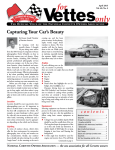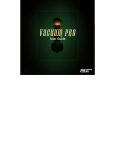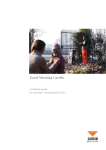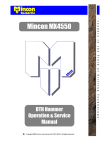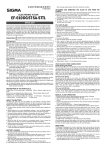Download EMILY WILSON
Transcript
ViewFinder Winter 2008 Holiday Stories emily wilson ARTHUR KRASINSKY Capturing International Color © Emily Wilson Dennis Tannen Working the Light CHRIS Buhlmann Youth Sports in Full Zoom Rick Sheremeta Views from the Islands TAMRON UNVEILS ITS 2009 Photo Contest Inform • Welcome Dear contents Viewfinder Readers: what’s inside • snapshots 3 • spotlight 4-5 • share 6-8 • learn 9 • share 10-11 • learn 12-13 Hot Off The Press NEW Product Announcement Dennis Tannen Working The Light Chris Buhlmann Youth Sports in Full Zoom Arthur Krasinsky Capturing International Colors Tamron's 2008 Wet & Wild! Photo Contest Winners Emily Wilson Holiday Stories • inspire Rick Sheremeta Views From the Islands 14-15 • tips to go Rob Moody Metering 16 Tak Inoue President, Tamron USA Introducing the... • inform 17 • survey 18 2009 Photo Contest Americana: Photographs That Define American Culture P hotos captured over the holidays often take on special significance because they generally include family members and loved ones who are not often seen. For parents with small children, it can be the only time a group photo is prepared, showing friends and family another milestone in their family’s growth. Tamron is proud to be an important resource during this special time of year. Our high-quality lenses are used by photographers of all skill levels for every kind of photographic genre. In this issue of Tamron Viewfinder, Dennis Tannen provides insight into capturing images with limited lighting challenges using Tamron’s 17-50mm lens. Chris Buhlmann, known for his military photography, spends his fall weekends chronicling his son’s youth football games with his Tamron 18-250mm lens. He provides insight and tips on using this compact all-in-one zoom, which is light and easy to maneuver as he pans the action. Emily Wilson gives us great tips using our award-winning 18-200mm lens with a true wide to ultra tele zoom design. Arthur Krasinsky took both Tamron’s 28-300mm and 11-18mm lenses on his trip to Italy and shows off the many ways these lenses can frame a shot. Lastly, Rich Sheremeta took some time off and relaxed in the U.S. Virgin Islands with his Tamron AF17-35mm lens. We have just introduced a new ultra wide-angle zoom lens – the SP AF10-24mm Di II with unprecedented focal length range – that also offers exceptional range and versatility for shooting wide angle shots. The Grand Prize Winner of our 2008 Wet & Wild! Photo Contest is showcased in this issue, along with several honorable mentions. We received thousands of entries and we are delighted with the results. In this issue, we are also announcing Tamron’s 2009 Photo Contest theme - Capturing Americana: Photographs that define American culture. You are encouraged to enter photos that showcase your idea of Americana. Please continue to fill out the survey on page 18 so that we can bring you the topics and stories that interest you most. As always, thank you for your loyalty and for choosing Tamron lenses. We sincerely appreciate your business. Sincerely, Tamron SP AF10-24mm Di II High-performance Ultra Wide-angle Zoom Lens with Unprecedented Focal Length Range The new Tamron 10-24mm lens is the first-ever 2.4x ultra wide-angle lens for digital SLR cameras. Features include a focal length range with the 35mm equivalent of 16mm ultra wide-angle to 37mm semi-wide-angle in a user-friendly lightweight, compact design. This versatile ultra-wide-angle zoom lens shoots expansive landscapes and extraordinary close-ups. See page 3 to learn more. Become a Tamron Fan! 2 – Tamron Viewfinder/Winter 2008 Tamron Viewfinder is produced for Tamron USA, Inc. by CSJ Media, Inc. Custom Publishing Dept., Hilton Head Island, South Carolina. Editor: Ann Scott www.tamron.com Image by Tom Till Spotlight • Dennis Tannen Dennis Tannen's ATOMIC APPROACH 4 – Tamron Viewfinder/Winter 2008 D ennis Tannen enjoyed photographing his shipmates on the naval ship he was stationed on during the Vietnam War. He was so prolific, he eventually earned a spot in the famed Defense Photography School in Pensacola, Florida where he learned techniques and elements of form. He has become a master of what he refers to as the “atomic approach” in photography. “I walk around the subject just as the protons and electrons go around the nucleus, I am observing the subject from all different angles, paying attention to the background. The background should not distract from the narrative,” he says. His determination to understand the subject and the ancillary components inside the frame results in final images where his primary subject stands out. On a trip to the Kaanapali coast in Maui, Hawaii, Dennis was given a simple request by his wife, “She wanted a photo of palm trees for our wall.” He chose to capture the photo in the late evening as the setting sun colored the background behind a team of trees cooling along the beach. In order to set up the full size portrait he used the Tamron 17-50mm lens with is Nikon D200. “I love the range,” says Dennis. “I like Tamron lenses because they are an excellent value. “ Dennis pays particular attention to the challenge of capturing images that reflect as close to what he sees in a scene. For the palm trees, he wanted to insure the graduation of color in the sky was apparent in his final photo. To accomplish this he used only available light, ISO100, a focal length of 35mm and an aperture of f/11 @ 1/60th sec. When Dennis’ friends recently got married in San Clemente, California he wanted to build a story around the intimate event. As the groom and his son were getting dressed, the bride’s gown hung above a doorway that created dynamic shadows amongst powerful lighting. “I set the camera in full program and captured the image. This gave me a basis www.tamron.com of how to fine tune the final shot.” Dennis acknowledges that the full program mode can be tricky with challenging light, but it offers a good starting point. “Spot metering on the boy would have blown everything out and wouldn’t have shown the detail of the boy’s skin.” He then shot in manual mode and adjusted the shutter speed until he attained the skin tone that looked the most natural. He used an aperture of f/5.6 to get a good depth of field @ 1/60sec. The focal length was 50mm, using the Tamron 17-50mm with available light and ISO100. In his images of the wedding, Dennis integrates the surrounding light into the photos. He is especially interested in chronicling the story as it unfolds. When photographing the wedding rings, he personifies them with the groom’s band looking on from the background and the bride’s dazzling ring sparkling. It is a perfect metaphor for a wedding. He shot the two during the reception using Tamron’s 90mm macro lens. Using the direct sunlight, he positioned a solid white card adjacent to the rings and bounced light to help illuminate the rings and capture the silver tones. The aperture was f/7.1 @ 1/125th sec with ISO100. The final act of a wedding is the customary throwing of the bouquet. As the sun was setting, the bride and eligible women gathered for the ritual. Dennis always likes to use the available light even if there is little available. He wanted to shoot a wide angle shot and again used the Tamron 17-50mm lens with a focal length of 35mm. He positioned himself on the ground and shot upward, capturing the bouquet as it traveled with the final light of day disappearing over the hill. The aperture was f/3.2 @ 1/30th sec., with ISO400. Dennis’ images can best be described as a storytelling genre where all the natural elements are pulled together and used to help provide a narrative. He readily admits he is often more focused on the story than the technique. He credits Tamron with providing “high quality glass” for shooting high quality images.” “Tamron makes quality affordable.” A quality lens is the difference between good and great. Visit Tamron. com to view the many lens options to fit your genre. www.tamron.com Storytelling Tips Don’t be afraid to use available light. 1. Using only natural light is a great way to help tell a story. the exposure in full program then 2.Test switch to manual to ‘fine tune’ shots. Incorporate the “atomic approach”, 3. move around the subject and visit it from different angles. To view more images by Dennis Tannen, visit www.dennistannen.com Spotlight • Chris Buhlmann P Capturing the Intensity of Youth Sports hotographer Chris Buhlmann can take up to 500 frames in one youth sporting event. What began as a simple desire to capture the emotion and intensity of his son’s football games has grown into an interest in recording the story of one season after another, transforming him into an instant celebrity and the most sought after spectator of the game. “The kids and parents look forward to the html email the same day to see the pictures,” says Buhlmann. “They enjoy it and it adds to their total sports’ experience.” Buhlmann uses the Pentax K20D and 10D cameras to shoot and his Tamron AF18250mm F/3.5-6.3 Di-II LD Aspherical (IF) 6 – Tamron Viewfinder/Winter 2008 Macro. “If you are a parent photographer you do not need to spend thousands to shoot sports to get the same quality as the pros,” says Buhlmann about Tamron lenses. “Tamron mechanics work very well with Pentax; the 18-250 is very compact, focuses real quick and shoots very sharp images.” Buhlmann advises any youth sports’ photographer to invest in a compact all-in-one zoom like Tamron’s 18-250mm lens. “For kid’s sports, you don’t want equipment that gets in your way. It needs to be compact because you should be moving around.” Telling a season’s story includes more than just the action. Buhlmann shoots a series of photos when the kids are warming up, including coaching moments. During an evening practice, he shot an image of the coach preaching to his team as the children intently looked on. The focal length was 250mm with an aperture of f/6.3 @ 1/400th sec. Because it was a night shot, he used ISO3200. “With the exceptional image quality at high ISO of today’s Pentax or other industry names, you have f-stop flexibility even in tough lighting conditions resulting in crisp images with little noise. The primary tip Buhlmann insists upon for any youth sports photographer is to “get out of the stands and get on the field.” “Don’t worry about being on the opponent's sidewww.tamron.com lines either, as long as you stay neutral to the action you should have free range.” He positions himself where the best lighting is available and will sometimes use a monopod. He shoots the warm ups to fine tune his set up making sure that no matter where his lens points, it will not be into the sun. “Use the light to your advantage,” he says. “Position yourself where the best lighting is and move with the action. Don’t wait for the action to come to you.” For outdoor football you should probably have lapped the field a few times in a game. The typical technique of panning the action and shooting should be offset with other kinds of photos as well suggests Buhlmann. Capturing intimate clues to a hard fought game helps to provide context. “Muddy feet define the experience of the game,” he says. His image of the nameless legs with scattered dirt and mud was shot at a focal length of 250mm using ISO500 with an aperture of f/6.3 @ 1/250th sec. Another important approach in capturing the determination of youth sports is to make contact with the player’s eyes. According to Buhlmann, the grit and resolve that is part of a player’s drive is always apparent in the eyes. His photo of the running back being chased by two linebackers offers a telling narrative. The player looks intently at his pursuers, keeping his left arm poised between them and the ball. He froze the action using f/6.3 @ 1/400th sec. with a focal length of 250mm, ISO200. Buhlmann sets up his cameras for the sRGB color space. “sRGB more accurately represents the colors as you would view or print them” he says and as such will keep certain jersey colors like reds from appearing oversaturated. For white jerseys, using a camera’s fine tuning color balance ability can help you fine tune your image making. As a game changes between daylight to night time Buhlmann suggests updating your white balance and continue to consult your histogram to tweak your exposure. “Don’t let the camera do all the setting,” he advises “Remember that a camera is still shooting to match to a standard 18% gray card. During transitions from daylight to night field lighting your camera may need a bit of your attention to get the right exposure and the right white balance. Buhlmann generally uses center-weighted average metering when shooting because of the many variables associated with sports including jersey colors, bright lights, speed of movement, etc. In youth sports, spot metering on any one subject could over or under expose other areas of the shot. Once the center-weighted averwww.tamron.com Tamron Viewfinder/Winter 2008 – 7 5 Learn • Top 5 Travel Tips from Arthur Krasinsky Well-known photographer Arthur Krasinsky, whose photography includes three U.S. Presidents and numerous corporate projects, spent some time in beautiful Sicily. His series of photos showcase several interesting ways to frame a shot. He used a Nikon D200 camera and Tamron’s 28-300mm and 11-18mm lenses. 1. Trust your eye and shoot everything that catches it. For Krasinsky’s photo of the Palermo Cathedral, he used Tamron’s 11-18mm super wide-angle zoom lens because he wanted to include as much as possible in the frame, from the tree in the foreground to the sky hovering over the towers. He used a focal length of 18mm, ISO100 with an aperture of f/5.6 @ 1/125sec. “Use the light to your advantage,” he says. “Position yourself where the best lighting is and move with the action. Don’t wait for the action to come to you.” sportingTIPS Use a big memory card. Most photographers 1. who shoot youth sports shoot hundreds of images in one afternoon or evening. stands 2. andGet getoutintoof thethe action. Uniform colors and background hues may 3. becontrols challenging. Understand your cameras for color space, white space and metering to get the best image possible. sure your lens iS panning and focused 4. Make on the action. Don’t wait for the action to come to you. a compact all-in-one lens with an 5. UseTheexpansive focal length like Tamron’s 18-250mm. speed of sports makes changing lenses in mid-game often prohibitive. 8 – Tamron Viewfinder/Winter 2008 age is determined, he manually adjusts accordingly usually not needing to change by more the + or – a 1/3 or a stop. With the exception of lightning, youth sports are played rain or shine. Buhlmann’s image of number 20 leaping for a pass in a heavy downpour is a testament to the commitment of the game. No doubt some great plays are made in heavy downpours requiring loyalty and devotion on the part of the team photographer. Buhlmann credits Tamron lenses for their durability and exceptional glass in challenging situations like inclement weather. He works regardless of the conditions. He employed a focal length of 200mm with an aperture of f/6.2 @ 1/400th sec., ISO800. For a telescoping zoom like the Tamron 18-250, he has used a Ziploc bag to cover the lens, opening up a hole on the bottom and wrapping it around the lens body for extra protection. Most importantly, Buhlmann captures all the kids, “Be inclusive of everyone,” he says. It will add to the story of each season and provide smiles and memories well into old age for each participant. On a bright, sunny Saturday afternoon, one young receiver breaks a tackle and looks sure to outrun another. It may be his greatest moment and it has been frozen in time. Buhlmann used ISO320, a focal length of 250mm with an aperture of f/8 @ 1/500th sec. Youth sports is loved by the parents as well as the players. Capturing the great “fish stories” of amazing strength and superhuman moments are what Tamron lenses have been doing season after season. www.tamron.com In the following images, Krasinsky used the 28-300mm lens. 2. Pre-set your camera for exposure and lighting. Images like the gloomy street scene require quick reflexes in order to capture a roving pedestrian. Prior to taking the shot, Krasinsky pre-set his camera, metering off a neutral colored subject so that he would be ready for any shot. The focal length was 28mm, ISO320 with an aperture of f/5.6 @ 1/60 sec. He also used a neutral density filter to increase the richness of the colors. 3. Look for intuitively framed shots. The man looking out the open shutter window was so finely framed that Krasinsky was drawn to the shot. He used available light, metering off the wall. He chose the Tamron 28-300mm for this shot because he liked the wide angle and the sharpness of the telephoto. He used the full focal length of 300mm, ISO320 with an aperture of f/6.3 @ 1/125 sec. 4. Illuminate evening shots. Krasinsky wanted to capture the spirit of the evening with his photo of the gelati storefront. In order to show detail and capture the vibrant lighting he metered off the lightest part of the subject which was the stove. He used only available light, but slowed the shutter speed in order to create the slightly moving image of the clerk. The focal length was 200mm with an aperture of f/6.3 @ 1/15 sec. 5. create a silhouette. The outline of a subject with featureless interiors provide numerous narratives. Krasinsky’s silhouette of a person seated in a café includes not just an image of a patron, but it also illuminates the wine and the blues of the glass objects on the table. He used a wide open aperture of f/2.8 @ 1/125 sec with a focal length of 200mm and ISO320. www.tamron.com Tamron Viewfinder/Winter 2008 – 9 Share • 2008 Contest Winners Wet & Wild! Photo Contest Winner Stays True to Tamron Lenses Photographing the Natural Wonder of Water grand prize winner: John O’Bryan of Moscow, Idaho is the 2008 winner of Tamron’s Wet & Wild! Photo Contest. Competing with almost 1500 entries, O’Bryan’s photo truly captures the natural wonder of water and exemplifies an element that not only sustains us, but excites us as well. “I came across the contest as I was looking for a new lens to purchase,” says O’Bryan, who entered the photo at the urging of a friend. “Contest themes are the best way for photographers to innovate their craft,” says award-winning photographer Don Gale who was the guest judge for this year’s contest. “As with this year’s Wet & Wild Contest theme, photographs really showed great composition and creative genius by many of the photographers and, not surprisingly, it was extremely difficult to narrow to just one. As I instruct my students, participating in these award programs helps to build a stronger more diverse portfolio and provides an important outlet for honing and sharpening their craft.” O’Bryan began using Tamron lenses in college, “I purchased a 300mm F/2.8 Tamron lens and used it for a number of years, often shooting better pictures with it than many other photographers who were shooting with more expensive Canon and Nikon lenses.” PEOPLE'S CHOICE winner: After selling all his photographic equipment many years ago to put a down payment on his first home, O’Bryan once again went back to photography. “A few years back I decided to purchase a digital SLR and because of my positive experience with Tamron lenses, I bought a Tamron 28-80mm and a 70-300mm to go along with it. I have not been disappointed. I really love the quality and durability of these lenses and have taken thousands of pictures with them.” It was Tamron’s 70-300mm lens and a Nikon D50 that has immortalized his daughter Allison, tubing on Priest Lake, in Tamron’s 2008 winner’s circle. The focal length of the image was 300mm with an aperture of f/6.0 @ 1/1000 sec. As the Grand Prize Winner, O’Bryan will receive Tamron’s AF28-300mm F/3.5-6.3 XR VC Di lens with Vibration Compensation technology. “I am absolutely thrilled to have won the lens. I plan to use it for taking pictures of the family skiing this year. I really like the idea of not having to change lenses on the mountain and am anxious to try the Vibration Compensation since I am not as steady with a long lens as I used to be.” Grand Prize: The 2009 Tamron Photo Contest theme is - Americana: Photographs that define American culture. Start shooting today and enter before October 31, 2009 for a chance to win! See page 17 for details. Tamron AF28-300mm VC! 10 – Tamron Viewfinder/Winter 2008 Donald Handley’s intriguing photo of the cowboy and his new bride took the 2008 Wet & Wild! People’s Choice Award. “I picked this particular photo because it tells a story. What story it tells depends on the frame of mind of the viewer. I was very pleased with the lighting and the overall balance of the exposure.” The couple were actually models for a photography class. “I used the Tamron 18-200mm zoom, which I had borrowed to try out. Based on how well this and other shots that day turned out, I bought the newer 18-250mm.” Handley used a Pentax K10D with the Tamron lens. The focal length was 138mm with an aperture of F/6.3 @ 1/250sec. “[The lens] gave me the quick ability to adjust composition on the fly before making the exposure,” says Handley. Handley earned a $100 gift card for winning the 2008 Wet & Wild! People’s Choice Award. Visit Tamron.com to view more Wet & Wild! photos. www.tamron.com www.tamron.com Tamron Viewfinder/Winter 2008 – 11 Learn • Seasonal Showcase/Emily Wilson B Delicious Holiday Photos H oliday photos typically depict children and families in their best dressed outfits set alongside a lighted tree or poised on a hearth with fixed smiles or comfortable grins. Often, the best photos are not static and instead depict life candidly and as it moves. Tamron’s AF18-200mm F/3.5-6.3 XR Di-II LD does just that. Photographer Emily Wilson took a series of photos with this all-in-one lens using just the 18mm and the 200mm focal lengths to prove its superior performance from wide open to full telephoto. This high quality zoom lens is not only affordable, it provides an expansive range that can be used for family portraits and holiday programs that often require a telephoto. C 4. Photo D was taken using a focal length of 200mm with ISO400 and an aperture of f/6.3. It is focused in on the creation with the chef happily looking on. 5. Shooting indoors can also be challenging. Wilson waited for the sun to rise over the house to eliminate a bright, lit kitchen that might create shadows. The light was eventually partially overcast creating a setting that required her to use a slower shutter speed of 1/30-1/25. She also set her flash to a very low setting of 1/16-1/32 of full power and bounced it behind her, “I didn’t use a light a meter, I could just tell from looking at my subject’s face that a little bounce of light would fill in nicely.” Don’t let the holidays fly by without embracing the hustle and bustle of living through it. Tamron’s 18-200mm lens was made for capturing life at any angle. Oh, Deer 1. In Photo A, Wilson used a focal length of 18mm, an aperture of f/3.5 @ 1/60 with ISO400. She used a step ladder to angle downward onto her subject. For creative, Wilson suggests that the chef could be a mom or perhaps even a single woman who plans to use the photo to create holiday cards or thank you notes. Wilson’s creativity extends across many facets of photography. She has recently introduced her mini-mantra series, photographing antique images from popular culture and titling them with inspirational and humorous mantras. A series is limited to six prints, available in limited quantities of just 100. Prints are signed, numbered and ready for framing. The images were shot using the popular Tamron 90mm Macro lens creating a shallow depth of field. Tamron is currently offering a $90 rebate on this lens. 2. Photo B was also shot at a focal length of 18mm, but she used an aperture of f/6.3 and slowed the shutter speed to 1/30 with ISO400. Wilson suggests composing a mother/child working shot that could include children busy in the background as their mother shows off the finished product. Slow the shutter speed to increase the motion in the background while freezing the subject in the forefront to create a “busy bees cooking with mom” scenario. 12 – Tamron Viewfinder/Winter 2008 A www.mini-mantras.com 3. Homemade desserts are not meant to be perfectly round. The uniqueness of each layer of cookie in photo C immediately says “Delicious!” Wilson used the widest focal length at 200mm with an aperture of f/6.3 @ 1/40 sec. with ISO400. Even with a fully expanded lens, the image is clear and crisp. www.tamron.com D www.tamron.com www.emilywilsonphotography.com Tamron Viewfinder/Winter 2008 – 13 Safety Tips for Lens & Camera Inspire • Travel Tips/Rick Sheremeta 1. Brushing - Use a make-up brush to remove any sand/salt. 2. Wiping – Use a clean terry cloth towel to wipe off the exterior of the lens and camera. 3. Capping - Always keep the lens cap on when not shooting. Other needs: Hot moist outside conditions and inside air conditioning pose a problem with condensation. If it’s really hot and humid, Sheremeta keeps his camera and lens in a large size zip-lock bag when he first goes outside until camera body and lens have warmed up to ambient conditions – otherwise condensation will form and can pose a real problem with optics and internal electronics especially if any salt residue remains on equipment. Rick Sheremeta's ISLAND PARADISE A pproximately 1100 miles southeast of Miami, Florida lies the beautiful U.S. Virgin Islands. Photographer Rick Sheremeta spent some time on St. Thomas and St. John during its early spring season, capturing the remarkable landscape that has made these islands a favorite for millions of tourists annually. Sheremeta is well-known for his nature and wildlife photography. “I really like to shoot places and the outdoor environment. I strive to capture the mood and essence of the scene.” For his Virgin Island photos, he used a Canon EOS 1D Mark II and his Tamron 17-35mm lens. He was drawn to the composition of each photo based on a sense of place and mood. “All of these scenes begged for use of a wide angle lens especially due to the 1.3 magnification factor of my camera body,” says Sheremeta. “Tamron’s 17-35mm lens is light, has good quality optics and I find that it provides a good range of wide angle focal 14 – Tamron Viewfinder/Winter 2008 lengths.” In addition to the 17-35mm, Tamron has just introduced another high performance ultra wide-angle zoom lens, the SP AF1024mm Di II with unprecedented focal length range. His sunrise shot of the lonely boat waiting for the day to begin was shot on the East end of St Thomas with St. John in the background, using a focal length of 17mm, ISO100 with an aperture of f/16@ 1/15 sec. He captured the shot using just the ambient light. Getting the image offered some challenges. “Protecting your gear from salt and sand is always something that you need to be aware of in this type environment,” advises Sheremeta. “The morning I was shooting, my camera accidentally fell off the tripod right at the surf line. Luckily, the wave had just ebbed so the camera fell into wet sand and not water. Thankfully the camera landed on its backside, not on the lens and my EOS 1D Mark II has good weather proof seals otherwise it could have been disastrous.” His photo of the contrasting pebbles leading up to an old shack was taken on St. John. “I liked the saturated colors of the overcast day with the pebbled beach. The little shack tucked into the tropical foliage just made the shot complete and helps pull your eye into the image.” To create the illusion of a far off getaway, www.tamron.com Sheremeta was positioned at the bottom of a hill and shot upward. He used only ambient light with ISO400. The focal length was 28mm with an aperture of f/16@1/125 sec. In order to accommodate for low light, Sheremeta typically uses a tripod. “I use a tripod for early morning and late in the day shooting when lighting conditions limit me to a slow shutter speed or when I purposely want to shoot at a slow shutter speed, such as photographing a flowing stream or water fall. But for most in-the-field work I generally shoot hand-held. I just keep my shutter speed faster than the reciprocal of lens focal length or try to find something close by to steady my camera using it like a makeshift tripod.” The photo of the wooden boat, settled on a pebble beach in St. John, reminded Sheremeta of Daniel Defoe’s Robinson Crusoe. “This shot had all the ear marks of an exotic island hidea-way. Without the hull this would be like any other photo of a sleepy lagoon, nice but not exceptional – it’s the boat that really makes the shot.” The shade covering the hull created a challenge, however when lighting the image. “With uneven lighting, one of the problems is the difference in dynamic range between the exposure of the sky and that of the foreground,” says Sheremeta. “I metered on the sky and water - which were pretty much about the same exposure value giving them about a +1/3 compensation - so they would render correctly and not appear blown out.” He used a focal length of 17mm with ISO400, an aperture of f/22 @ 1/80 sec. “Since there was so much exposure difference between the sky and boat, metering on the sky meant that the foreground would be so www.tamron.com much darker and that all shadow detail would be lost - so I used a fill flash to lighten the shadows, make the boat pop-out as the main subject, and even out the overall exposure to within the dynamic range of the camera’s image sensor.” Had he metered off the boat, the background would have been grossly overexposed and totally blown-out sky with no cloud detail. His leaning palm was also shot on St. Thomas. The photo is side lit with a focal length of 35mm with ISO100, and an aperture of f/18@1/80 sec. “I spot metered the sky, the water, a palm leaf and sand in the foreground to check for differences in exposure, then exposed for sand at +1 compensation knowing that the sky and everything else would be exposed correctly.” The first tip for traveling photography is to take a versatile lens that is durable and offers expansive opportunities. Sheremeta’s choice of the Tamron 17-35mm lens provided wide angle capabilities that effectively captured the nuance and character of one of the world’s most sought after vacation spots. One lens that can be used for all shots makes it less likely to change lenses outdoors and introduce blowing debris or sand into the lens and camera body. Tamron offers a wide array of all-in-one lenses to capture any scenario. To learn more about Rick and his work, visit www.alpenglowproductions.com Tamron has just introduced the SP AF10-24mm Di II high-performance ultra wide-angle zoom lens with unprecedented focal length range. See page 3 for details. Tips to go METERING For Indoors & Low Light Subjects D uring an evening shoot recently on the Mall in Washington DC, I was presented with metering issues photographers face regularly. Lighting during the holidays, in arenas and in mixed, low light conditions can present a photographer with challenges. In this series of images, I shot hand-held and was fortunate enough to use the Tamron 28-300 VC lens with Vibration Compensation technology, capturing blur-free images in low light. Today’s DSLR cameras offer FullWeighted, Center-Weighted and Spot metering modes. Understanding each and employing the correct one greatly increases your chances of creating a properly exposed image in difficult light. • Using the Full-Weighted metering mode, the camera evaluates the entire or most of the area of view in order to calculate the exposure. • Using the Center-Weighted metering mode, the camera favors the center area of view and considers the side areas less as it calculates the exposure. • Using the Spot metering mode, the camera only uses a small spot area in the center of the viewfinder to evaluate the exposure. With practice, photographers instinctively know which metering mode to use. Most of the time, Full-Weighted metering will achieve the desired results. If you are unsure which metering mode to use, it is a good practice to start with Full-Weighted metering (often the camera’s factory default position), move to Center-Weighted and then to Spot meter if the scene dictates it. Be sure to test your shots before shooting an important event. Consult your user manual for the exact details, nomenclature and specifications of your particular camera. 16 – Tamron Viewfinder/Winter 2008 with Rob Moody Image #1 – For this image from inside the Abraham Lincoln Memorial, I used the Spot metering mode to achieve the desired exposure. The Full-Weighted metering mode would properly expose for the indoor room, but would have made the statue of President Lincoln over exposed. Using CenterWeighted metering mode would improve the statue detail, but it would still be over-exposed. Spot metering off of the base perfectly exposed the statue. Image #2 - In this case, I shot the Washington Monument with the moon overhead from inside the Lincoln Memorial. I used the Center-Weighted metering mode to achieve the desired exposure. Using Full-Weighted metering would have properly exposed the columns, but the outside area beyond the pillars would have been too dark. Spot metering could have over exposed the entire image depending on exactly where the meter reading was taken. Inform • 2009 Tamron User Photo Contest Americana: Photographs that define American culture The Tamron User Entering the Best Image of Americana Will Receive a Tamron AF18-270mm VC Lens! Baseball, apple pie, diners, drive-ins, folk art, what is your image of Americana? Enter Tamron’s USER 2009 Photo Contest and showcase your image of what makes America tick! From its music to its main streets, America is defined by its history and its present, how we live and breathe within the fabric of our society. 1. Must use a Tamron lens. 2. Must enter the Tamron lens used and camera model for the image to qualify. 3. Only THREE entries per person. 4. Must be a U.S. resident to enter. The AMERICANA Grand Prize Winner will receive the AF18-270mm F/3.5-6.3 XR VC Di lens valued at $599! Tamron’s state-of-the-art Vibration Compensation mechanism is combined with the world’s largest zoom ratio of 15X, allowing the user to capture panoramic landscape images or close-up pictures. The winner will have his or her image showcased in Tamron Viewfinder and in the Gallery section of Tamron.com. Up to 20 favorites will also have their winning images published on the website for all to see. DEADLINE: OCTOBER 31, 2009 Grand Prize! Image #3 - For the WWII Memorial, I used the Full-Weighted metering mode to achieve the desired exposure of the overall scene. Using Center-Weighted metering would have caused the overall exposure to be too dark. Using spot metering wouldn’t have included enough information to achieve a proper exposure. www.tamron.com AF18-270 VC Lens (Vibration Compensation) Prize Valued at $599 (average price) View full contest rules at www.tamron.com/enews/archives/contest.asp www.tamron.com Tamron Viewfinder/Winter 2008 – 17 Grand Prize: s n e L n o r m a T ✔ orvette t C a o ✔ ur C awaii F ✔ rip to H T ✔ Imagine getting your very own Tamron AF28-300mm VC Lens tied up in a big bow! It is one of our most exciting lenses and we're offering everyone who answers our survey a chance to win this exceptional grand prize! Tamron Viewfinder is successful because so many of our readers take the time to answer our surveys. This is how we know what you are interested in seeing in our newsletter. JUST Answer A Few Questions: GENDER: M ❍ F ❍ Age Group: ❍ Under 25 ❍ 25-34 ❍ 35-44 ❍ 45-54 ❍ 55-64 ❍ Over 65 What camera(s) do you own? ❍ Canon ❍ Nikon ❍ Pentax ❍ Sony ❍ Konica Minolta ❍ Fuji ❍ Film Model What would you like to see featured in upcoming issues of Viewfinder? ( Pleae check all that apply.) ❍ Pro Photographer Profiles ❍ Product Spotlights ❍ Photoshop Tips ❍ Pet Photography ❍ Sports Photography ❍ Wedding Photography ❍ Special Events Photography ❍ Other ❍ Reader Profiles ❍ Lighting Tips ❍ Travel/On-Location ❍ Portrait Photography ❍ Contests ❍ New Product News ❍ 18-250mm Di-II ❍ 18-270mm Di-II VC ❍ 55-200mm Di-II ❍ 28-75mm Di ❍ 28-200mm Di ❍ 28-300mm Di ❍ 28-300mm Di VC ❍ 70-200mm Di ❍ 70-300mm Di ❍ 200-500mm Di ❍ 90mm Di ❍ 180mm Di REPLY TO US via internet or print & fax back to us at (631) 543-3963. Rules: Surveys must be completed in full and submitted or faxed by December 31, 2008. No entry will be accepted without all questions answered. Enter only once. Only one entry per household, no duplicate submissions or faxes will be accepted. All prizes are selected randomly and awarded 60 days after electronic mailing of last Tamron Viewfinder of 2008. NAME: ADDRESS: CITY:STATE:ZIP: EMAIL: 18 – Tamron Viewfinder/Winter 2008 AF28-300mm F/3.5-6.3 XR Di VC (Vibration Compensation) Camera shake can ruin your photos, particularly at telephoto or in low light. Tamron’s state-of-theart Vibration Compensation mechanism incorporated into the award-winning 28-300mm zoom gives you blur-free hand-held images for incredible results! Finally, the technology you need in the lens you want. see the lens in action at www.tamron.com Other Prizes you could win! TAMRON $50 Gift Card (3 prizes) Gift Card to your favorite authorized Tamron dealer What may be your next lens purchase(s)? (Please check all that apply.) ❍ 10-24mm Di-II ❍ 11-18mm Di-II ❍ 17-50mm Di-II ❍ 18-200mm Di-II Tamron AF28-300mm VC! TAMRON Rollerball Pen (5 prizes) TAMRON Baseball Cap (20 prizes) TAMRON Lens Cleaning Cloths (200 prizes) TAMRON T-Shirts (50 prizes) 50 $










